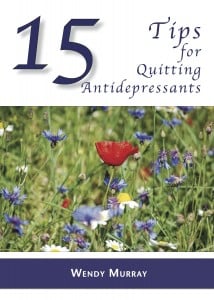by Wendy Murray
In keeping with my posts this month — Mental Health Awareness month — I include below an account of an experience I had with a medical professional who proved unhelpful and even belligerent in my attempt to seek her help in withdrawing from my antidepressant. I have learned that this story is typical and many patients, like myself, contend with unhelpful doctors. I want to be clear that, even as I write about my experience with this one professional, I also saw several other doctors who were supportive and strongly engaged in my struggle. This is not a rallying cry to rebel against health-care professionals. Let it simply be a word about some potential difficulties a person who is tapering may encounter from their doctors.
 I had reached the stage of taking a very low dose (6.5mg) of citalopram during my second attempt to discontinue my antidepressant when the alarming symptoms persisted without relief and were deteriorating. This is when I took the initiative to see a professional who, I had been told, specialized in helping patients navigate the rough stages of tapering. This proved not to be the case — quite the opposite, actually — but, regardless, my situation was compromised and I went to see this “expert” (a psychiatric nurse practitioner) as a matter of blind trust.
I had reached the stage of taking a very low dose (6.5mg) of citalopram during my second attempt to discontinue my antidepressant when the alarming symptoms persisted without relief and were deteriorating. This is when I took the initiative to see a professional who, I had been told, specialized in helping patients navigate the rough stages of tapering. This proved not to be the case — quite the opposite, actually — but, regardless, my situation was compromised and I went to see this “expert” (a psychiatric nurse practitioner) as a matter of blind trust.
At my first visit, with hardly a discussion, this NP promptly changed my medication. She told me to stop taking citalopram and wrote me a prescription for Zoloft with instructions to reinstate at 25mg for one week and then to up the dose to 50mg after that.
My taper of citalopram had been excruciating and undertaken with meticulous attention to detail, measuring each drop in dose by notches on a syringe. Then, just like that, I was to be done with all that. When I registered concern about ending citalopram in such a decisive sweep, this NP dismissed it. My dosage was so low it wouldn’t make any difference, she said. Had she no clue of the anguish even a diminishment of even a single half of milligram inflicted on me?
I sat in her office stunned and helpless. Of course I would reinstate, what choice did I have? She seemed to know what she was talking about, or least I told myself this. My taper was not working and I needed help. This was the help she was remitting. I left her office half-dazed to find myself in a situation I had not expected, nor was prepared for. As I turned out of her office to go down the hall, she leaned back in her chair and called out, “Don’t forget: 50 mg after a week!“
I knew instinctively in that moment that I would never up my dose to 50 mg. My biggest challenge (apart from the inevitable “period of adjustment”) was how I was going to deal with the follow-up visit in two week’s time not having followed her instructions.
Putting myself under the care of this new professional had the feel of being a very dark turn for me, and it was. Not only had I reinstated, but I had been put on a dose far greater than that which I had reached in reducing. Worse, she prescribed needed supplementary pharmaceuticals to “manage” the extraneous adjustments that afflict patients who are transitioning between meds.
I complied, but I despaired that my hard-won efforts had been lost. On that day, when I knew I would not be following this NP’s protocol, I crossed the invisible line of asserting some level of control over this process even if it meant refusing to comply with my doctor’s stated terms. Noncompliance means simply not following through on your doctor’s instructions.
This decision did not mean in my mind necessarily dismissing my doctor’s input or judgment. It simply meant a willingness on my part to allow that my own research and knowledge of the intricacies of my effort, too, were a valuable consideration of this complex journey. No one knows my body and brain the way I know it. So on the day when I reinstated with 25mg of Zoloft and was emphatically instructed to double that dose after a week’s time, I made my own calculations. I had found myself under orders of an insistent doctor who — right off, during the first visit — I was not sure I trusted.
I had read a well-curated blog about tapering written by a man who, like I, was struggling to get off his antidepressant. Many readers registered comments about turmoil they confronted when dealing with their doctors, whether having their meds changed, or general dismissals about their tapering symptoms, or the readiness of doctors to mix in additional drugs to quell the effects of the antidepressant. The sentiment seemed fairly prevalent that, among the other of the multiple challenges patients face while trying to get off these drugs, one of the most formidable was the doctors themselves. To one such struggler this blog host made a concession: a successful taper could not be done without some degree of non-compliance.
On my return visit to this NP two weeks after she upended my citalopram taper and reinstated me at 25mg of Zoloft, I again found myself in her office trying to explain that I was unsettled about the new strategy. I told her I wasn’t convinced SSRIs were continuing to help me and that, in fact, they were affecting me negatively, which is why I started tapering. I told her I did not like the fact that now that I am readjusting to a new medication, I must also now take Ativan to settle the jitters and Ambien to help me sleep, when my whole intention is to get off the meds. I told her that I likened the effort to discontinue to my trying to steer a ship out of a storm into a place of peaceful waters.
That’s when this NP got belligerent with me. “All this talk about steering a ship into peaceful waters — you wouldn’t be saying that if this were about diabetes,” she said. Then she added that I needed to change my thinking and consult a counselor about this problem.
It was a one-way conversation. I left her office feeling diminished and my concerns dismissed. Instead of getting the help I sought, I received rebuke with the “you-wouldn’t-say-this-about-diabetes” argument. She proved unwilling to engage with me mutually and respectfully about my concerns. Instead, she bullied me by telling me I needed counseling.
Thankfully, she did not ask whether I had upped my dosage from 25mg to 50mg, which I hadn’t. So I was spared having to tell her a lie.
If after the first visit I had left her office conflicted. Now, after the second consult, I was ready to write a negative Yelp review warning patients: Stay away from this drug-pushing bully!

I never went back to her. (Nor have I written the Yelp review, though I may still.) However, since it was the brain we were dealing with and I couldn’t keep jerking it around, I was obliged to follow through with the regimen she had prescribed.
I did my best to settle into the new medication, suffering greatly (again) through the adjustment period that lasted more than a month. I took a time out from tapering to let my body and brain recover from this shock. And all the while, I nourished myself through good eating, vitamins and herbals, and waited before determining the right time to begin what for me, would be my third and final attempt to end the madness and get off these drugs. I had determined that I would succeed at the third attempt, or would die trying.
To be continued . . .










